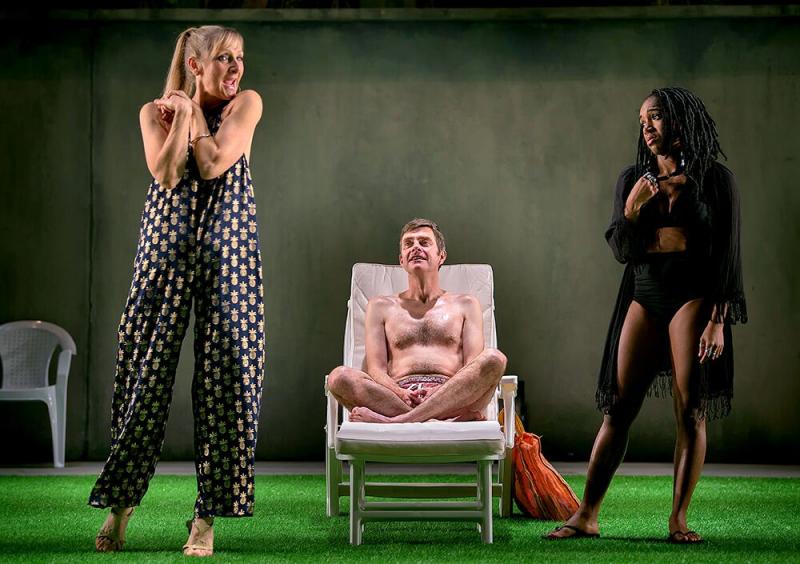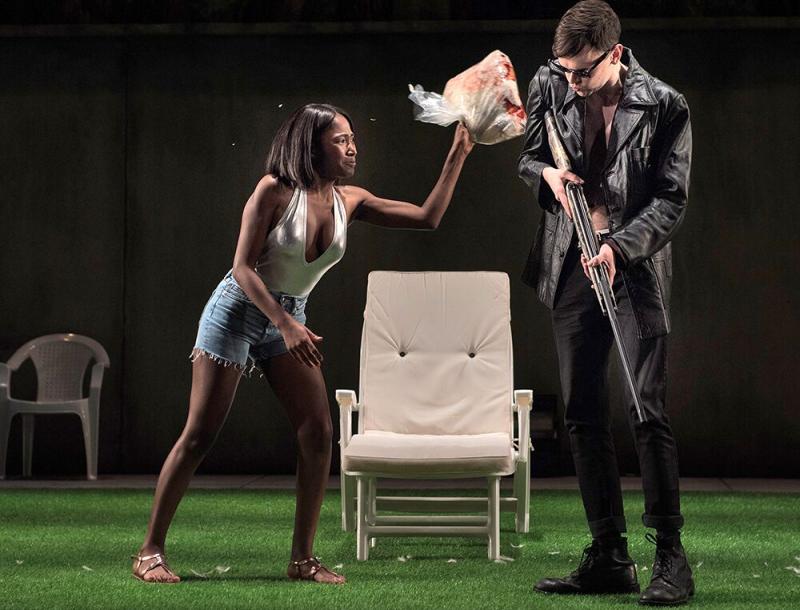The Seagull, Lyric Hammersmith review – is Lesley Sharp's Irina a sex addict? | reviews, news & interviews
The Seagull, Lyric Hammersmith review – is Lesley Sharp's Irina a sex addict?
The Seagull, Lyric Hammersmith review – is Lesley Sharp's Irina a sex addict?
Chekhov's classic bird updates entertainingly, even if lopsidedly, as a play for today

The awful mother, the celebrity-obsessed teenager, the mediocre old writer who wants some young sex in his life – there are motifs in Chekhov’s The Seagull that fly merrily from one century to another, and Simon Stephens and
The vision borrows something from reality TV shows. Director Holmes cuts urban characters adrift, naive Nina in her jeans shorts, over-yummied mummy Irina in her LK Bennett spikes, Marcia and Konstantin dressed like streetmarket goths, marooned in an unfocused countryside location (design by Hyemi Shin), casually signalled by a backcloth of birchwoods, blank walls, cheap plastic patio chairs. Lounging at the lakeside, the visitors gaze out at us in the auditorium as if we were the lake and the rising moon. And we might as well be an ocean, since they can’t get away until the carthorse is freed from ploughing and can carry them to the station. Where are Uber and mobiles when you need them?
Eventually the damage to the original does catch up
This radical timewarping leaves a fair bit of damage to Chekhov’s themes in its wake. Writer Stephens modernises the dialogues workably with naturalistic fucks and shits, which elide into the higher-flying speeches with one or two wincing gear-changes to express the mindset of characters whose self-absorption and indolence were of their time. Since much of the play is a mirror in which Chekhov studies himself, his surrogates, the two writers Boris and Konstantin, do sound pretentious in the update.
The other casualty is the mother-son plot. Heartless actress Irina, who sees in her son an awful reminder of her advancing age, can't be a pitiable as well as comic figure today without more explanation than we're given. Is she a sex addict? Um, let's ask Chekhov.
Still, one can just about overlook such great big problems, because The Seagull has another life as a touching comedy about unrequited love, almost A Midsummer Night's Dream.
Irina needs (and graphically screws) Boris, who desires Nina, who is venerated by Konstantin, who is fancied by Marcia, who reluctantly marries Simeon who adores her but she doesn’t return it. And Marcia’s mother Pauline, who’s bored by her crashingly unfunny farmer husband Leo, is panting to get off with the doctor, Hugo, who despite his good looks doesn’t want sex with anybody. Where's Puck when you need him? There's lots of good body language and the Shakespearean disorientation is assisted by Pete Malkin's arch music work with Vivaldi (I loved the little musical announcements for Irina’s entrances) and nice shadow-puppet scene changes lit by Anna Watson. A major gain is that Chekhov's hierarchy is emotionally rebalanced towards side characters, such as Michele Austin's excellent Pauline and Cherrelle Skeete as her self-medicating, angry young daughter, Marcia, the most genuine, intelligent character of them all. (I wonder what Skeete would do with Nina's role.)
A major gain is that Chekhov's hierarchy is emotionally rebalanced towards side characters, such as Michele Austin's excellent Pauline and Cherrelle Skeete as her self-medicating, angry young daughter, Marcia, the most genuine, intelligent character of them all. (I wonder what Skeete would do with Nina's role.)
The leading characters have a trickier job. Adelayo Adedayo (pictured above with Brian Vernel as Konstantin) with her soubrette presence has to work hard for modern emotional resonances in Nina, and on first night didn’t scale the difficult heights needed to reconcile the anomalies in what should be an aching last scene.
For eventually the damage to the original does catch up. I found it increasingly hard to keep sympathy for the central pair, mother Irina and son Konstantin, Lesley Sharp and Brian Vernel, both acting as if via Tannoy in a storm.
Sharp makes a stage-hogging Irina, breathtakingly TOWIE on her first entrance, mutton dressed as WAG, swinging her shiny ponytail and shimmying alluringly in her backless onesie. Her voice honks through the hubbub with hints of Kenneth Williams, and when she isn’t being beastly to her son, she disintegrates into childishness, hunkering under the table with him inappropriately, or plopping onto the doctor’s lap, seeking kisses, and practically raping Boris. Virtuosic, but not really plausible. And Vernel invests Konstantin (why?) with an intrusive Scots accent and insistent delivery that becomes monotonous rather than haunting. So the tragedy is rather thrown away.
Much more interesting is the fresh playing of the autobiographical role, "man of letters" Boris, by Nicholas Gleaves. A reticent figure in a hat, belting his jeans selfconsciously, he is Mr Cellophane at first, which makes his outburst to the celebrity-obsessed Nina about the agony of being a writer who's certain of his own mediocrity all the more touching. It’s a little hard to believe that this man would behave so indecently to Nina later. Which is, of course, sadly relevant today.
rating
Explore topics
Share this article
The future of Arts Journalism
You can stop theartsdesk.com closing!
We urgently need financing to survive. Our fundraising drive has thus far raised £49,000 but we need to reach £100,000 or we will be forced to close. Please contribute here: https://gofund.me/c3f6033d
And if you can forward this information to anyone who might assist, we’d be grateful.

Subscribe to theartsdesk.com
Thank you for continuing to read our work on theartsdesk.com. For unlimited access to every article in its entirety, including our archive of more than 15,000 pieces, we're asking for £5 per month or £40 per year. We feel it's a very good deal, and hope you do too.
To take a subscription now simply click here.
And if you're looking for that extra gift for a friend or family member, why not treat them to a theartsdesk.com gift subscription?
more Theatre
 Mary Page Marlowe, Old Vic review - a starry portrait of a splintered life
Tracy Letts's Off Broadway play makes a shimmeringly powerful London debut
Mary Page Marlowe, Old Vic review - a starry portrait of a splintered life
Tracy Letts's Off Broadway play makes a shimmeringly powerful London debut
 Little Brother, Soho Theatre review - light, bright but emotionally true
This Verity Bargate Award-winning dramedy is entertaining as well as thought provoking
Little Brother, Soho Theatre review - light, bright but emotionally true
This Verity Bargate Award-winning dramedy is entertaining as well as thought provoking
 The Unbelievers, Royal Court Theatre - grimly compelling, powerfully performed
Nick Payne's new play is amongst his best
The Unbelievers, Royal Court Theatre - grimly compelling, powerfully performed
Nick Payne's new play is amongst his best
 The Maids, Donmar Warehouse review - vibrant cast lost in a spectacular-looking fever dream
Kip Williams revises Genet, with little gained in the update except eye-popping visuals
The Maids, Donmar Warehouse review - vibrant cast lost in a spectacular-looking fever dream
Kip Williams revises Genet, with little gained in the update except eye-popping visuals
 Ragdoll, Jermyn Street Theatre review - compelling and emotionally truthful
Katherine Moar returns with a Patty Hearst-inspired follow up to her debut hit 'Farm Hall'
Ragdoll, Jermyn Street Theatre review - compelling and emotionally truthful
Katherine Moar returns with a Patty Hearst-inspired follow up to her debut hit 'Farm Hall'
 Troilus and Cressida, Globe Theatre review - a 'problem play' with added problems
Raucous and carnivalesque, but also ugly and incomprehensible
Troilus and Cressida, Globe Theatre review - a 'problem play' with added problems
Raucous and carnivalesque, but also ugly and incomprehensible
 Clarkston, Trafalgar Theatre review - two lads on a road to nowhere
Netflix star, Joe Locke, is the selling point of a production that needs one
Clarkston, Trafalgar Theatre review - two lads on a road to nowhere
Netflix star, Joe Locke, is the selling point of a production that needs one
 Ghost Stories, Peacock Theatre review - spirited staging but short on scares
Impressive spectacle saves an ageing show in an unsuitable venue
Ghost Stories, Peacock Theatre review - spirited staging but short on scares
Impressive spectacle saves an ageing show in an unsuitable venue
 Hamlet, National Theatre review - turning tragedy to comedy is no joke
Hiran Abeyeskera’s childlike prince falls flat in a mixed production
Hamlet, National Theatre review - turning tragedy to comedy is no joke
Hiran Abeyeskera’s childlike prince falls flat in a mixed production
 Rohtko, Barbican review - postmodern meditation on fake and authentic art is less than the sum of its parts
Łukasz Twarkowski's production dazzles without illuminating
Rohtko, Barbican review - postmodern meditation on fake and authentic art is less than the sum of its parts
Łukasz Twarkowski's production dazzles without illuminating
 Lee, Park Theatre review - Lee Krasner looks back on her life as an artist
Informative and interesting, the play's format limits its potential
Lee, Park Theatre review - Lee Krasner looks back on her life as an artist
Informative and interesting, the play's format limits its potential
 Measure for Measure, RSC, Stratford review - 'problem play' has no problem with relevance
Shakespeare, in this adaptation, is at his most perceptive
Measure for Measure, RSC, Stratford review - 'problem play' has no problem with relevance
Shakespeare, in this adaptation, is at his most perceptive

Add comment